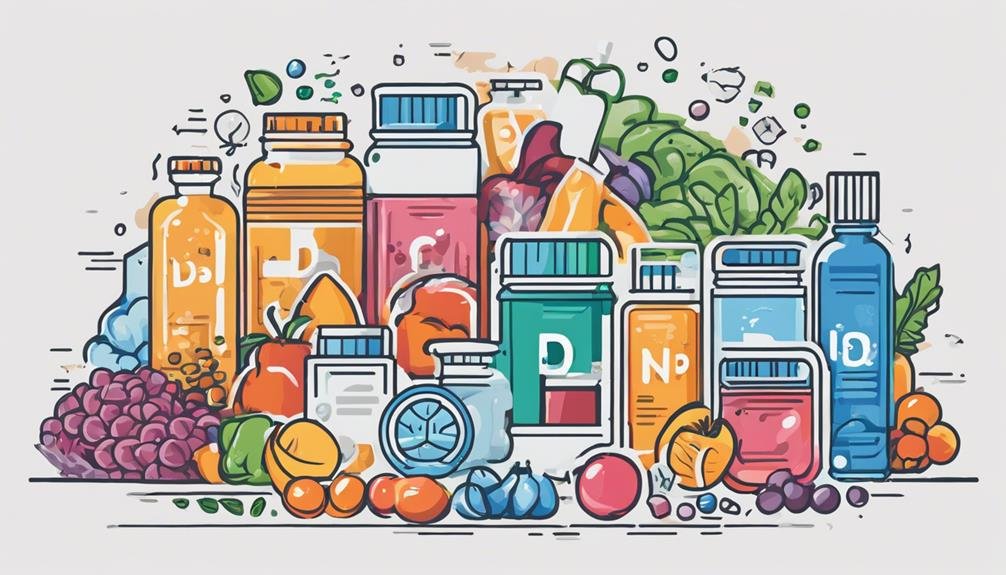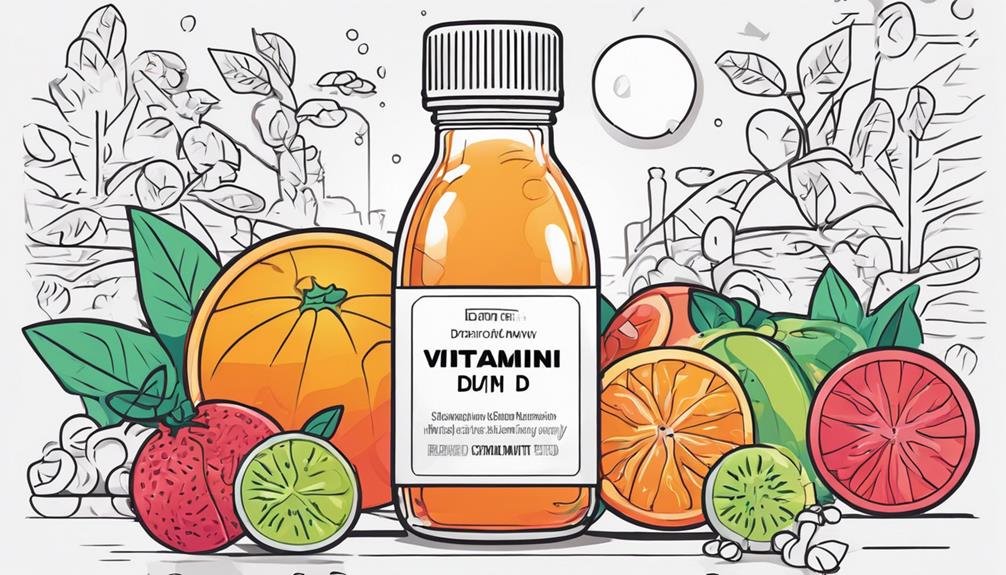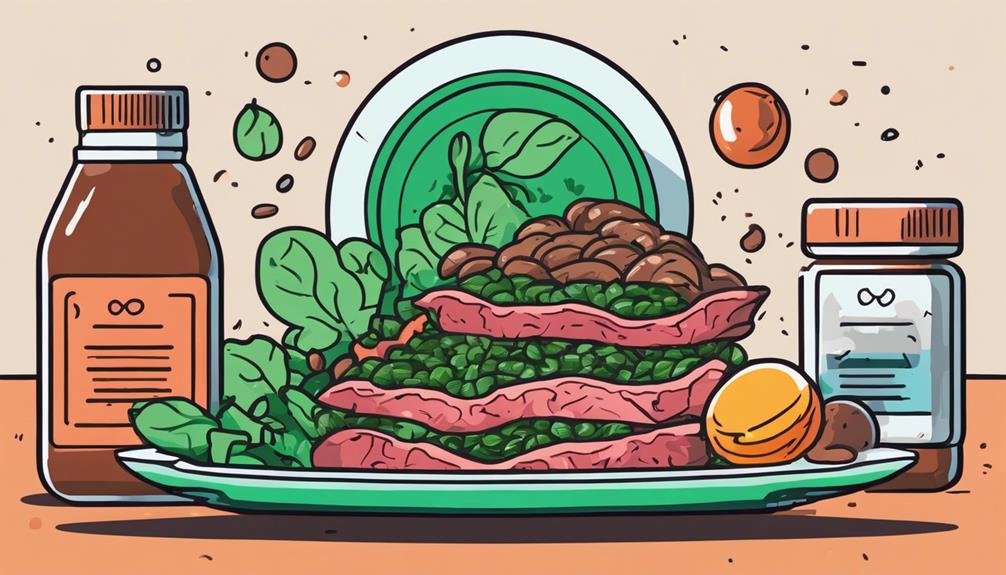Have you ever wondered about the key supplements that can significantly impact your child's health and well-being?
When it comes to ensuring your little one's optimal growth and development, certain essential supplements play a vital role.
From supporting bone strength and immune function to boosting metabolism and energy levels, these top 5 supplements are crucial for overall health.
Stay tuned to discover how incorporating these key nutrients into your child's diet can make a difference in their daily life and long-term wellness.
Key Takeaways
- Calcium supports bone development and teeth formation, crucial for children's growth.
- Vitamin D boosts the immune system, aiding in overall well-being.
- Omega-3 fatty acids enhance brain function and cognitive health in children.
- Iron maintains energy levels by transporting oxygen, preventing fatigue and weakness.
Importance of Essential Supplements

Understanding the crucial role that essential supplements play in supporting your child's overall health and development is key to ensuring they thrive and grow optimally.
Vitamin D is essential for bone health and immune function, making it a vital supplement for children. It promotes calcium absorption, which is crucial for strong bones and teeth.
Omega-3 fatty acids are necessary for brain development and cognitive function, impacting your child's learning and memory.
Iron is vital for red blood cell production, preventing anemia and ensuring your child has the energy to fuel their activities.
Probiotics play a significant role in supporting gut health, which is linked to overall immunity and digestion.
Calcium for Strong Bones
To ensure your child's bones grow strong and healthy, incorporating an adequate amount of calcium into their diet is essential. Calcium plays a vital role in bone development and teeth formation in children. It helps build bone reserves that are crucial for later years, ensuring optimal bone health and bone strength as they grow.
Daily intake recommendations vary based on age to support growing children: 700 mg for ages 1-3, 1,000 mg for ages 4-8, and 1,300 mg for ages 9-18. It's important to include calcium-rich foods like leafy greens, fish, dairy, and tofu in your child's meals to meet these requirements.
Vitamin D for Immune Support

Ensuring your child receives an adequate amount of Vitamin D is crucial for supporting their immune system. Vitamin D plays a vital role in bolstering your child's immune system, helping to fight off infections and keeping them healthy.
Children need a minimum of 400 IU of vitamin D daily for optimal health, according to the American Academy of Pediatrics. While sources of vitamin D include fish, eggs, and fortified milk, families following a vegetarian diet can turn to fortified cereals to meet their child's vitamin D needs.
Supplements can also be a reliable way to ensure your child is getting enough vitamin D, especially if they've limited exposure to sunlight, which is also a source of this essential nutrient. By incorporating vitamin D-rich foods and possibly supplements into your child's diet, you can help strengthen their immune system and support their overall well-being. Remember, a little vitamin D can go a long way in keeping your child healthy.
Omega-3 for Brain Health
For optimal brain development and function in children, incorporating omega-3 fatty acids like DHA and EPA into their diet is crucial. Omega-3s, found in fatty fish like salmon, walnuts, and flaxseeds, play a vital role in supporting brain health. Research indicates that omega-3 supplements may enhance cognitive function, focus, and behavior in kids.
If your child doesn't consume enough fish or has dietary restrictions, supplementing their diet with omega-3s can be beneficial. These essential fatty acids are known to aid in learning, mood regulation, and overall brain health in children. By ensuring an adequate intake of omega-3s, you're providing your child with the necessary building blocks for a healthy and thriving brain.
Consider incorporating sources of omega-3 into your child's meals or opting for supplements to support their cognitive development and well-being.
Iron for Energy Levels

If your child often feels tired or lacks energy, ensuring they get enough iron in their diet is essential for maintaining healthy energy levels. Iron plays a crucial role in the transport of oxygen in red blood cells, which is vital for sustaining energy levels. Children aged 4-8 need around 10 mg of iron daily, while those aged 9-13 require about 8 mg daily to support their growth and development. Including iron-rich foods like lean meats, poultry, fish, beans, and fortified cereals in your child's diet can help meet their iron needs naturally.
Iron deficiency can lead to anemia, causing symptoms such as fatigue, weakness, and impaired cognitive function in children. If you suspect your child may have an iron deficiency, consulting a healthcare provider is essential to determine the appropriate course of action. It's important to be cautious with iron supplementation, as excess intake can lead to potential side effects. Prioritizing iron intake through diet and proper guidance can significantly improve your child's energy levels and overall well-being.
Frequently Asked Questions
What Are the Essential Supplements for Kids?
To support your child's dietary needs, growth development, and immune system, consider essential supplements like vitamin D, omega-3, calcium, iron, and probiotics. They aid in brain health, energy, bone strength, and overall wellness.
What Is the Best Nutritional Supplement for Kids?
For kids, the best nutritional supplement provides support for immune health, growth, brain function, energy, bone strength, digestion, skin, allergies, focus, and sleep. Consider consulting a healthcare provider to determine the most suitable option.
What Are the 5 Most Important Vitamins?
To ensure your child thrives, focus on essential vitamins and minerals like Vitamin C for immunity, iron to prevent deficiency, calcium for strong bones, Vitamin D from sunlight, and Omega-3 for brain health.
Which Nutrient Is Essential for Children?
Ensuring your child gets enough calcium intake is crucial for their bone health. Iron deficiency can lead to anemia, so include iron-rich foods in their diet. Look for vitamin D sources to support their overall health and immunity.
Conclusion
You've learned about the top 5 essential supplements for children's health, but did you know that 85% of children don't get enough vitamin D?
By incorporating these crucial supplements into your child's diet, you can help support their growth and development.
Remember, consulting healthcare professionals for personalized recommendations is key to ensuring your child's overall well-being.
Take proactive steps towards a healthier future for your little ones!
